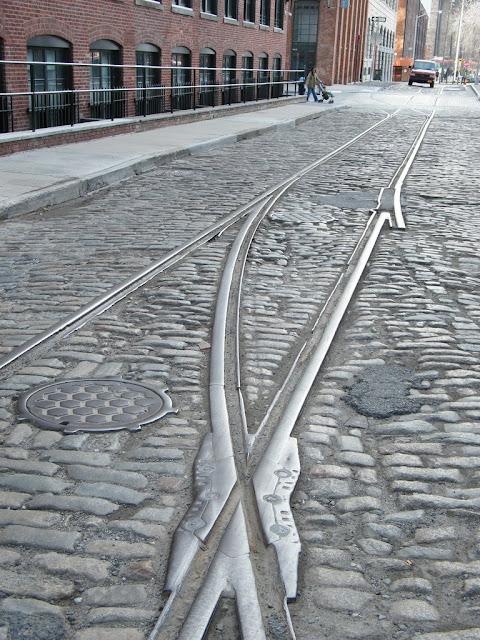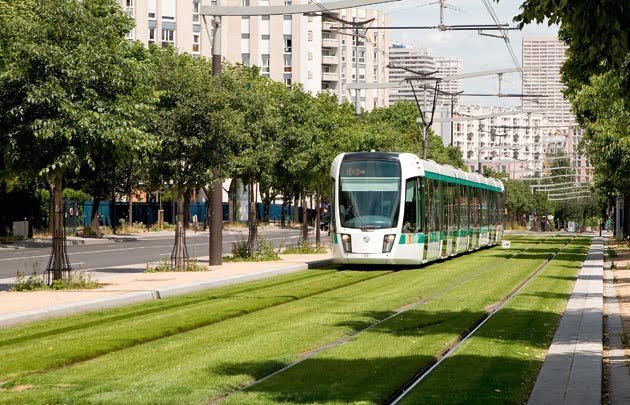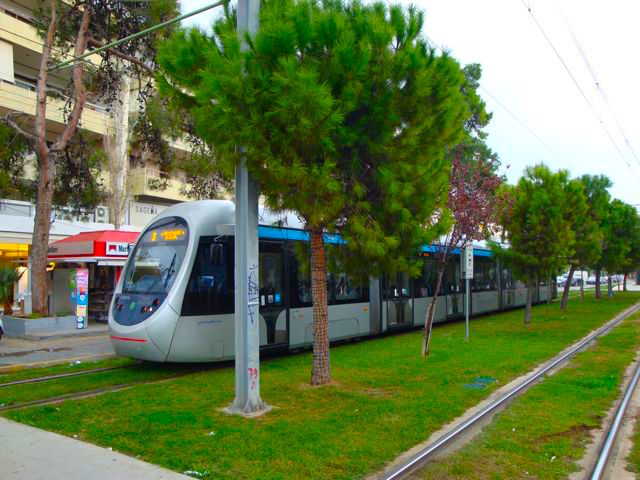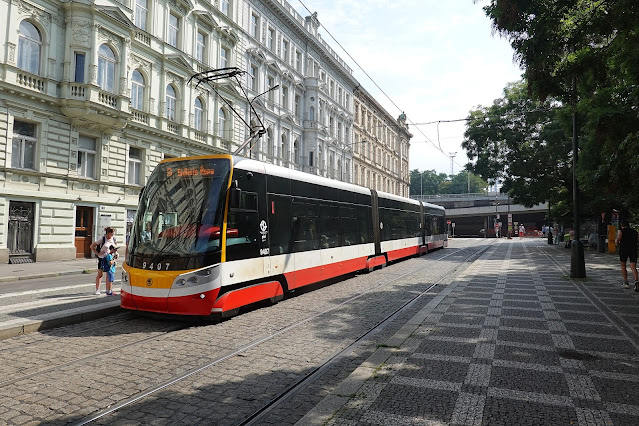https://www.facebook.com/NowThisNews/videos/1066779256745531/?pnref=story
You'll be able to watch this video without logging in. It takes 4 seconds to load.

Saturday, May 21, 2016
Trams - Streetcars - Trolleys - Light Rail
After living in Astoria, I learned that it used to have streetcars. 67 years ago, they rode along Broadway, near by home. What a great convenience. Visiting the Astoria Historical Society (also on Broadway), I saw this old photograph of Steinway Street & Broadway, circa 1929.
Where did they go? Why would such a wonderful trolley system be ripped up? Streetcars made less pollution/noise than buses--and are so handsome. What could possibly have been better to replace them?
Nothing.
Apparently, there were several streetcar lines in Queens, NYC. They were all abandoned between 1948-1950. Once again, we see that the post-war period in America was when many good things vanished.
Regarding New York City, some things have always been an uphill struggle for decency. Those streetcars were run by the Brooklyn-Manhattan Transit Corporation, a private entity not controlled by the city. It was the only profitable Rapid Transit entity in NYC--even during the Great Depression. In 1923, its president published a whistleblower letter of "Transit Truths" (we should be lucky to see such a thing nowadays). The company met with the bitter, personal, and unfair opposition from Mayor Hylan. "For seven years, you have been misleading and fooling the people in this community… For seven years, you have blocked every effort at transit relief." NYC's Mayor Hylan was approved for his job by the corrupt Tammany Hall, as well as the publishing monopolist William Randolph Hearst. After Hylan, Tammany installed boozy Mayor Jimmy Walker (a.k.a. Beau James). By then, Hylan realized the wrongs of his ways and was attacking NYC's "big interests", arguing that industrialists influenced politics and impoverished the working masses. Hindsight?
Watch the film "Who Framed Roger Rabbit" and notice that automobile manufacturers, gasoline companies, freeway builders, rubber (chemical) tire makers, and auto parts suppliers united to buy the tram systems... only to dismantle them and force citizens to buy automobiles or use gas-guzzling buses. Urban tales recount how buses sped up and cut in front of streetcars, in order to steal their passengers. Famously, those aforementioned industries bought percentages of Pacific City Lines, but instead of supporting the aging streetcars, had them replaced with the buses that they made... not for the public good.
Those powerful companies also realized that their competition (the streetcars) were often owned by electricity Power Authorities. In 1935, unknown forces pushed a Public Utility Holding Company Act through the government, forcing electric companies to divest themselves of their trolley/streetcar subsidiaries. Thus, the trolley/streetcar companies had to buy electricity at full price from their former parent-companies, removing their profit margins.
In addition, streetcar routes were built with private investor funding, but new public roads were constructed and maintained by the government (using taxes as funding). I wonder who arranged THAT handicap aid? Car companies?
The U.S. government responded to the Great Depression with massive subsidies for road construction, and ignored aging streetcar lines and mass transit. It was not the last time the government was "in bed" with the big auto makers. The federal Interstate Highway Aid Act of 1956 syphoned more money away from improving mass transit. In fact, it forced streetcar operators to pay to have their own rails relaid, after the construction of freeways removed them. To worsen matters in 1956 (the same year that GM chairman Charles Wilson was ALSO the Secretary of Defense), the federal government created a Trust Fund that only funded highway construction (until 1983 when a mere 10% finally went to mass transit).
In 1946, Edwin Quinby, founder of Electric Railroaders' Association (created 1934) published an exposé to mayors and tax-paying commuters, "This is an urgent warning that there is a careful, deliberately planned campaign to swindle you out of your most important and valuable public utilities--your Electric Railway System." His report spurred federal investigators, and on 1947, nine corporations were indicted in federal court of California on counts of "conspiring to acquire control of transit companies, to create a transportation monopoly" and "monopolize sales of buses". The nine corporations included General Motors, Firestone Tires, Standard Oil, Phillips Petroleum, and Mack Trucks. After appeals, they were finally convicted in 1949. Appeals continued until 1951, where the verdict was upheld... but what were the consequences? GM was fined a measly $5,000, and the GM Treasurer was fined only $1.00! Such pissing in the face of justice!
Meanwhile, during those ineffective court proceedings, the Baltimore Streetcar System was bought in 1948 and converted to buses. In 1949, the San Diego Electric Railway was bought and converted to buses. Whole cities were deprived of systems that should've been upheld for the benefit of the public. Once again, the actions and inactions of tax-paid government worsened tax-payers' lives. The surging--and reoccurring--Oil Crisis of the 1970s showed citizens how terrible it was to rely on poorly-made / gas-guzzling American cars (while living in the post-war sprawls of suburbia).
In 1974, a government attorney named Bradford Snell testified before the Senate Judiciary Committee that General Motors was in a plot to dismantle streetcars in order to build more vehicles and freeways. GM backed a company called National City Lines that bought and dismantled the streetcars.
We heard devilish things about GM before. Read the data here: http://halfwindsorfullthrottle.blogspot.com/2016/04/where-did-great-american-cars-go-into.html
Nowadays, NYC and its boroughs merely own faded remnants of their streetcar routes.
It's almost as if a ghostly clang might arise, as a tram glides around a corner.
Other parts of the world continue to maintain and enjoy their Light Rail systems:
Amsterdam, the Netherlands
*To see our first visit to that pretty city, click here: https://halfwindsorfullthrottle.blogspot.com/2019/08/our-trip-to-netherlands-part-1-of.html
Jerusalem, Israel
Dallas, Texas *To see when I rode one of them, please use this link:
https://halfwindsorfullthrottle.blogspot.com/2021/11/our-trip-to-helsinki-finland-part-1-of-4.html
Philadelphia, Pennsylvania
Switzerland
Marseille, France
Seville, Spain
Barcelona, Spain
Valencia, Spain
Philadelphia, Pennsylvania
Switzerland
Savannah, Georgia
Marseille, France
Seville, Spain
Barcelona, Spain
*To see our trip to Valencia, please use this link:
Milan, Italy
Rome, Italy
*To see our adventures in Milan, Florence, and Rome, please use this link:
https://halfwindsorfullthrottle.blogspot.com/2022/03/our-trip-to-italy-part-1-of-7-milan.html
Estonia
Latvia
Paris, France
Seattle, Washington
Cincinnati, Ohio
Toronto, Canada
San Francisco, California, has cable cars...
AND streetcars.
Wales
Colombia
Hong Kong, China
Kansas City, USA
Vienna, Austria
Estonia
Latvia
Paris, France
Seattle, Washington
Cincinnati, Ohio
Belgium
Dublin, Ireland
*To see our lucky time in the Irish capital, please use this link:
San Francisco, California, has cable cars...
AND streetcars.
Wales
Colombia
Hong Kong, China
Kansas City, USA
Vienna, Austria
Bergen, Norway
Germany
Germany's route in Leipzig is far-reaching into remote areas!
Japan
The Grand Duchy of Luxembourg
Rio de Janeiro, Brazil
Portland, Oregon
London, England
*To see our first trip to London, please use this link:
Oslo, Norway
*To see our exploration of gorgeous Oslo, please use this link:
Germany
Germany's route in Leipzig is far-reaching into remote areas!
*To see our fun in German cities, please use this link:
Japan
*To see our amazing journeys in Japan, please use this link:
The Grand Duchy of Luxembourg
Rio de Janeiro, Brazil
Portland, Oregon
London, England
*To see our first trip to London, please use this link:
https://halfwindsorfullthrottle.blogspot.com/2021/10/our-trip-to-london-uk-part-1-which.html
Moscow, Russia
I admire tramways in New Orleans and Glyfada, Greece, that created "greenways" for their rails.
Prague, Czechia. We think they have the world's best system.
Moscow, Russia
I admire tramways in New Orleans and Glyfada, Greece, that created "greenways" for their rails.
*To see our first time in Prague, please use this link:
Meanwhile, overtaxed New Yorkers schlep over unused rails...
(which were probably destroyed using tax dollars), and depend on the corrupt/filthy MTA subway/bus system. Otherwise, they use surge-charging Uber.
This year, NYC Mayor de Blasio proposed a streetcar route from Astoria to Brooklyn. Despite its 100-year existence, NYC's MTA never exerted itself to create a north/south route to connect Brooklyn and Queens; it merely concerned itself with "feeding" Manhattan. The Mayor's idea occurred after his ground-breaking construction ceremony at a condominium in Astoria--exactly where the streetcar route would begin. In true NYC style, the plan is overpriced at nearly $2 billion (to rebuild what they should never have destroyed in the first place) and will probably take 10 years for corrupt construction schemes to complete. Instead of the city reclaiming land from the East River to sustain a new tramway, the city uncaringly wanted to overcrowd the only road along the river. Eventually, the plan was discarded. (To lure residents, that condo created a shuttle-bus to bring them to the nearest subway station: 1.2 miles away). After all, NYC doesn't care.
Subscribe to:
Comments (Atom)
















.jpg)







































